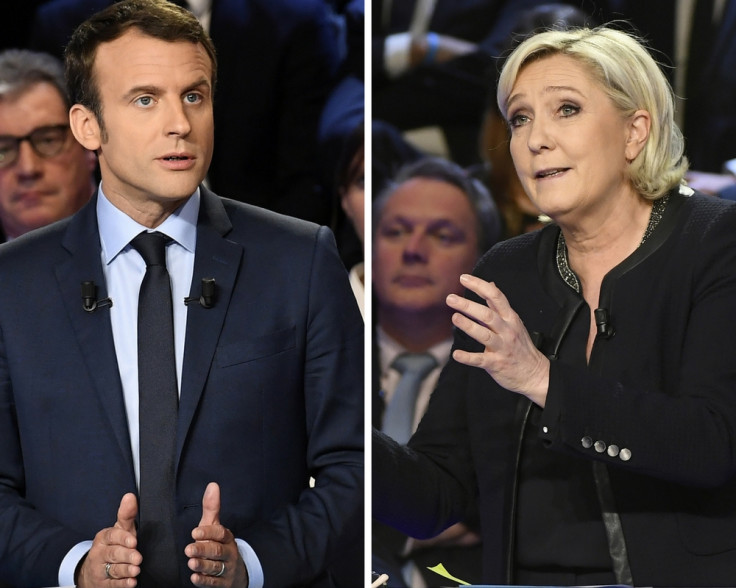France must choose between a smug elitist and an angry nativist
Emmanuel Macron and Marine Le Pen represent France's political divide over globalisation.

It's a contest both sides will relish. Each candidate embodies everything the other dislikes.
To Emmanuel Macron's supporters, Marine Le Pen is the worst kind of populist: promising to spend money she doesn't have, using immigrants as scapegoats, singing the Marseillaise while taking cash from the Russians, threatening the international order through her atavistic nationalism.
For their part, Le Pen's activists see Macron as a rootless internationalist, an over-privileged énarque who has never before deigned to seek elected office, a banker who got rich by moving money around rather than making things. Say what you like about the French election, but the country is being offered a real choice.
That choice reflects politics in many advanced economies at present. Depending on your point of view, you might either phrase it as liberalism versus nativism or as globalism versus patriotism. It amounts to the same thing, and it divides France pretty much down the middle. In the vote on 23 April, 49.44% of French voters backed pro-EU candidates (Macron himself, plus the Gaullist and Socialist contenders), while 49.31% backed Eurosceptics on the supposed far-left and far-right.
Not that those terms are especially useful. For once, the claim that we have "moved beyond left and right" is actually apposite. Politicians often breezily say that those labels no longer apply (though I have yet to meet a politician who doesn't find them very useful in private conversation). In this election, though, that axis simply doesn't fit.
Le Pen is, on economics, well to the left of the Socialist Party, let alone of Macron. She wants higher taxes, higher spending, higher tariffs and more workers' control of businesses. The same is true, incidentally, of many European parties labelled "'far right". Like the Front National, they march on May Day under red flags, and define themselves as anti-clerical and republican. They are right-wing only in the BBC sense of "baddie". Their hostility to immigration is the flip-side of their hostility to trade: their drawbridges are permanently up.
Mr Macron is no easier to define in left-right terms. Blair-like, he presents himself as someone who can on the one hand liberalise the economy and on the other spend more on the needy. In fact, his economic plans are almost as unrealistic as Mrs Le Pen's. The one thing he is clear about is that he likes internationalism generally, and European integration specifically.
Both candidates tend to elide economic and political globalisation as if they were the same phenomenon. They are not. Economic globalisation is people-driven. The reason goods and services cross borders is that people in other countries want to buy them. If a local producer is unable to compete with a foreign product, it is because his customers prefer that product. The spread of globalisation in this sense is a victory for people over governments – a reduction in the powers of the state.
Political globalisation is very different. It involves the setting up of international bureaucracies that aim to overrule elected national governments. It is top-down rather than bottom-up. It extends the power of regulators and reduces consumer choice. It is, in many ways, the exact opposite of the economic globalisation with which it is being lumped.
The problem with the EU is that it went from being largely about the first to being largely about the second. Its focus shifted from free trade to standardisation, from free movement of labour to uniform citizenship rights, from common market to common government. In doing so, it triggered a backlash that, in Le Pen's case as in many others, took an angry and ugly form.
The collapse of the traditional French parties – this is the first time in the history of the Fifth Republic that there has been neither a Gaullist nor a Socialist candidate in the final round of voting – ought to be a warning to Europe's political elites.
Although we kept being told that voting to leave the EU would "unleash" British "extremism", it has had the opposite effect. Our country seems set to vote for a traditional, moderate Conservative leader, offering free markets with social protection. We do not face, as France does, a choice between a smug elitist and an angry nativist.
Brexit, in short, has been the release valve, ensuring that Britain does not turn to the kind of distempered parties that have risen across Europe over the past eight years. Not for the first time, our democratic tradition is serving as a shelter against the tempestuous politics of neighbouring lands.
© Copyright IBTimes 2025. All rights reserved.






















